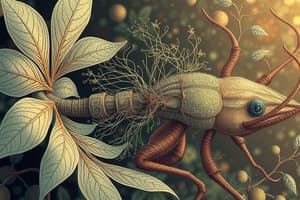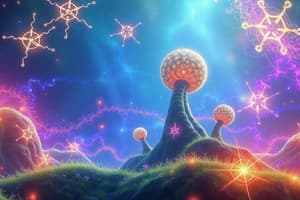Podcast
Questions and Answers
What is Biology?
What is Biology?
The study of life, defined by properties such as metabolism, reproduction, growth and development, and regulation.
How do biologists organize and categorize the diversity of life?
How do biologists organize and categorize the diversity of life?
Through emergent properties that arise at each level from the molecular level to the biosphere.
What is a hypothesis in biology?
What is a hypothesis in biology?
A prediction or answer to a well-framed question that must be testable and repeatable.
What is the difference between an element and a compound?
What is the difference between an element and a compound?
What most influences the chemical properties of a particular atom?
What most influences the chemical properties of a particular atom?
What type of chemical bond is found within a single water molecule?
What type of chemical bond is found within a single water molecule?
What type of bond forms between adjacent water molecules?
What type of bond forms between adjacent water molecules?
Explain how the product [H+] [OH-] = 10^-14 relates to the pH scale.
Explain how the product [H+] [OH-] = 10^-14 relates to the pH scale.
Why is carbon referred to as the 'backbone of life'?
Why is carbon referred to as the 'backbone of life'?
What is Carbon's valence?
What is Carbon's valence?
What are the two types of reactions involving water?
What are the two types of reactions involving water?
What defines all lipids from a chemical standpoint?
What defines all lipids from a chemical standpoint?
Why are proteins referred to as the 'workhorses of life'?
Why are proteins referred to as the 'workhorses of life'?
What aspect of DNA makes it unique?
What aspect of DNA makes it unique?
What is wrong with the statement, 'Prokaryotic cells typically have a smaller nucleus than eukaryotic cells'?
What is wrong with the statement, 'Prokaryotic cells typically have a smaller nucleus than eukaryotic cells'?
Why are certain organelles referred to as components of the 'endomembrane system'?
Why are certain organelles referred to as components of the 'endomembrane system'?
What does the term 'endosymbiont' mean?
What does the term 'endosymbiont' mean?
Flashcards are hidden until you start studying
Study Notes
Properties of Life
- Biology studies life, characterized by properties such as metabolism, reproduction, growth, development, and regulation.
- Living organisms demonstrate behaviors that define life, identifiable through observable actions.
Organization of Life
- Biologists categorize life using emergent properties that manifest at different levels from molecules to biospheres.
- Each level exhibits unique characteristics that arise from interactions within and between systems.
Biological Investigation
- Biologists employ the scientific method, formulating hypotheses as predictions to test questions.
- Effective hypotheses must be testable and repeatable, while some questions remain unanswerable through this methodology.
Elements vs. Compounds
- Elements are pure substances that cannot be broken down chemically; they consist of only one type of atom.
- Compounds are composed of two or more different elements combined in fixed ratios, demonstrating distinct properties.
Valence Electrons and Chemical Properties
- Valence electrons, found in the outer shell of an atom, greatly influence an atom's chemical behavior, determining reactivity and bonding.
Types of Chemical Bonds in Water
- Within a water molecule, a covalent bond forms between hydrogen and oxygen.
- Hydrogen bonds occur between adjacent water molecules, which are weaker than covalent bonds.
pH Scale and Water
- The pH scale is derived from the equilibrium of [H+] and [OH-] in pure water, both at 10^-7 under standard conditions.
- This balance defines the neutral pH level of water.
Carbon: Backbone of Life
- Carbon is essential to life, forming the basis for most cellular compounds due to its ability to form stable bonds with many elements.
Carbon's Valence and Bonding
- Carbon has four valence electrons, allowing it to form up to four covalent bonds, enabling complex molecular structures.
Reactions Involving Water
- Dehydration reactions join molecules by removing a water molecule, forming covalent bonds.
- Hydrolysis is the reverse, breaking bonds between monomers through water addition.
Characteristics of Lipids
- All lipids share a common property of being hydrophobic, meaning they do not mix well with water.
Proteins as the "Workhorses of Life"
- Proteins, including enzymes, perform essential functions repeatedly, facilitating cellular processes vital for life.
DNA and Heredity
- DNA consists of long molecules within chromosomes that carry numerous genes, serving as hereditary material.
Prokaryotic Cells and Nuclei
- Prokaryotic cells lack a true nucleus; their DNA is located in a nucleoid, not membrane-bound, differentiating them from eukaryotic cells.
Endomembrane System
- The endomembrane system includes the nuclear envelope, ER, Golgi body, and vesicles, highlighting their shared function in regulating protein traffic and metabolic activities.
Endosymbiont Definition
- The term "endosymbiont" refers to a symbiotic relationship where one organism lives inside another, significant in the evolutionary origins of organelles like mitochondria and chloroplasts.
Studying That Suits You
Use AI to generate personalized quizzes and flashcards to suit your learning preferences.




